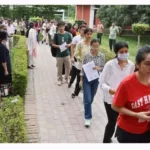The Indian Express – Reporting with Resolute ConvictionIn a fervent display of support for the prolongation of reserved seats in the Lok Sabha and state Assemblies for Scheduled Castes (SCs) and Scheduled Tribes (STs), the Central Government avowed its intent to bolster its case by providing additional substantiating evidence. Solicitor General Tushar Mehta, addressing a distinguished five-judge Constitutional bench led by Chief Justice of India D Y Chandrachud, expressed, “We intend to augment our argument by presenting more compelling material to underscore the indispensable need for continued reservation.”
The petitioners, represented by the venerable senior advocate Arayama Sundaram, articulated a profound concern. They inquired whether amendments to Article 334 of the Constitution, which extend the duration of reservation, warrant closer scrutiny through a judicial lens, given the restricted reservation policy embedded in the original constitution.
This legal discourse is poised to delve into the presence of objective and quantifiable data supporting such an extension, intended to shield it from accusations of manifest arbitrariness and violations of Article 14. Moreover, it will scrutinize whether this measure compromises the sanctity of the basic structure doctrine by diminishing the judicial oversight concerning constituency delimitation and the allocation of seats to SCs and STs.
In a perceptive observation, the bench indicated its forthcoming inquiry into the constitutionality of the Constitution (104th Amendment) Act of 2019, particularly in relation to SCs and STs. Importantly, the bench underscored that this assessment would not encroach upon the legitimacy of previous constitutional amendments predating the 104th amendment.
The pressing issue at hand is the validity of the 104th amendment concerning SCs and STs, as the provision for Anglo-Indians in Article 334(B) concluded with the passage of 70 years since the Constitution’s adoption.
As the legal proceedings advance, the nation watches with bated breath, awaiting the Supreme Court’s verdict on the crucial matter that could shape the future of reservation policies in India.






